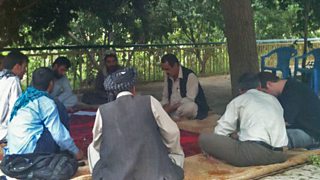Fieldwork for most seasons: research in Afghanistan
Craig Robinson
Βι¶ΉΤΌΕΔ Media Action’s Research Manager for Afghanistan
Tagged with:

Fieldwork in Afghanistan: Βι¶ΉΤΌΕΔ Media Action’s research team lead a group discussion.
For everything in Afghanistan there is a season. And conducting research in the country is no exception. Spring, summer and early autumn are the only times when researchers can go into the field. The first fall of snow that marks the beginning of winter blocks mountain passes, restricts progress on the country’s few roads and washes away others. The Taliban and other insurgent groups also suffer from the same problems, resulting in the creation of a fighting season that runs from about April to October each year. Unfortunately, the fighting season coincides with the fieldwork period, meaning that we seldom operate when the insurgency is not at its most active.
But it’s a common misconception that the Taliban operate across the whole of Afghanistan. The Taliban, and other insurgent groups, are at their most active in Pashtun areas, from which ethnicity they draw the overwhelming majority of their support. Consequently, where there are pockets of Pashtuns, e.g. Kunduz Province in the north, there is limited insurgent activity and where there is a Pashtun majority, e.g. Helmand, there is a very real contest for control of the province.
As the majority of the Pashtun population lives in the ‘Pashtun Belt’, which runs either side of the Afghan/Pakistan border to the east, through to Farah province in the west, this effectively means that the south and the east of the country are the key battleground between the insurgency and the government of Afghanistan.
Given the risk of travelling through these areas, there is a great pressure to not conduct fieldwork in this area, particularly from some of the research agencies in the country themselves. Whilst safety remains our top priority, Pashtuns represent the largest ethnicity in Afghanistan, roughly 40% of the population, and have dominated political power throughout the country’s history. Pashtuns therefore need to be included in any study if we are to gain a good understanding of issues in Afghanistan from multiple angles.
Accessing the opinions of women is the most difficult aspect of conducting research in Afghanistan. Afghan attitudes towards women tend to be conservative, especially in rural areas. Interviews with women can only be conducted by female interviewers and in some cases the researchers themselves need to be accompanied by male relatives or colleagues in order for them to travel. In many cases, ordinary Afghan women are reluctant to be interviewed, leading to professionals or the well-educated being the only participants. This invariably produces skewed data.
Because of the issues discussed above, conducting research in Afghanistan is exorbitantly expensive. Outside of the very large and reputable agencies, Afghan researchers will sometimes create further problems due to inexperience or fabrication. Why travel to the dangerous rural areas when you can interview people in the safety of the city and claim this took place in a village? Why risk a confrontation by asking to interview women when you can simply interview their husbands on their behalf? These are some of the issues experienced with some research agencies. With the impending withdrawal of International Security Assistance Force (ISAF) troops in 2014, these difficulties are only likely to increase.
Despite these difficulties in conducting research, the results always make the effort worthwhile
Do you want to know why the government is seen as corrupt? Come listen to the man who lost his land because the other side bribed the judge. You don’t understand why more women don’t get involved in public life? Meet the women from a rural focus group, who weren’t allowed to have their voices heard by other men and weren’t allowed to visit a local radio station. Do you want to know the real impact of your radio drama? Meet the women who only have an education because their father listened to an episode of that persuaded him to send his daughters to school.
It might be difficult to hear the voices of Afghanistan, but the stories they tell are poignant and worth listening to.
Related links
Elsewhere on Βι¶ΉΤΌΕΔ Media Action:
For more coverage of Afghan issues:
